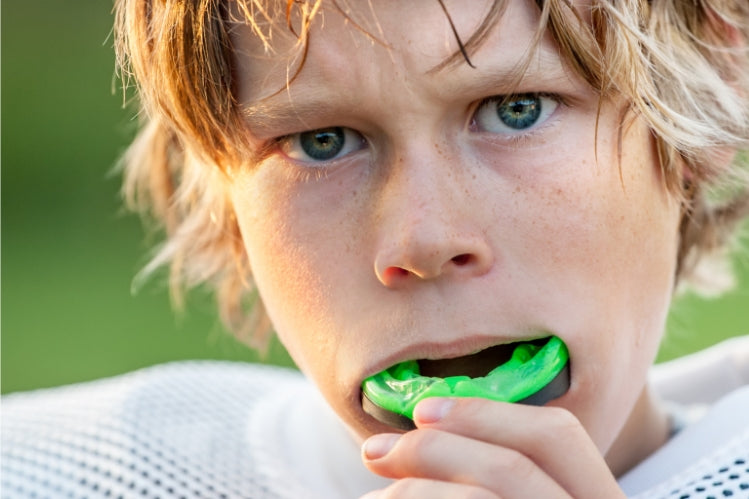
Table of Contents
- They Can Prevent Concussions
- Not All Mouth Guards Are Created Equal
- They Are Not Just For Contact Sports
- They Improve Athletic Performance
- They Need Proper Care to Work Effectively
- You Can Still Wear Your Mouth Guard with Braces
- They’re Required in Many Youth Sports Leagues
- Choosing the Right Sports Mouth Guards
- Recap
- FAQs
Protective dental gear, including mouth guards, are among the most essential pieces of equipment in any sport. From football to bike riding, having a mouth guard ensures that your teeth remain safe in the case of an impact, especially for the teeth and jaw.
When people think of sports mouth guards, many of them can easily assume their primary use and function, which is to protect the teeth and gums during any physical activity. To further explore the world of mouth guards, here are seven shocking facts about the protective gear that might interest you.
1. They Can Prevent Concussions
Sports mouth guards are commonly used to protect teeth from chipping, breaking, or even avulsing teeth. When worn correctly, mouth guards can reduce concussion risk since they manage and distribute the force of an impact.
How Does It Work?
When your jaw absorbs any external blow, the force can easily transfer to your head, thus causing a concussion. A mouth guard forms a barrier that reduces the force transferred to the teeth and the brain.
Key Tip: Always wear a custom-fitted mouth guard for maximum protection when playing contact sports such as hockey or rugby.
2. Not All Mouth Guards Are Created Equal
There are three main types of sports mouth guards: stock, boil-and-bite, and custom-fitted. All have their relative advantages and disadvantages, and it does not guarantee the same security level.
Stock Mouth Guards
These are pre-made and readily available in limited sizes. They are relatively cheaper but compromise the comfort due to them being bulky and not having the ideal fit.
Boil-and-Bite Mouth Guards
These are slightly better as they can be softened in hot water and molded to your teeth.
Custom-Fit Mouth Guards
These fit the best and provide optimal protection due to them using dental impressions to provide a custom fit. However, they cost more due to them being tailor-made for the user.
Fun Fact: Custom-fit mouth guards are highly recommended for professional athletes due to their excellent comfort and effectiveness.
3. They Are Not Just For Contact Sports
Do you think mouth guards are only used in sports such as football, boxing, or basketball? Think again!
Other non-contact sports such as gymnastics, skateboarding, and mountain biking are also dangerous to teeth. Dental injuries can also result from recreational activities such as trampoline jumping and much more.
Statistics
Data from the American Dental Association shows that nearly 40% of dental injuries are reported in sporting activities. Wearing a mouth guard while exercising helps prevent expensive dental operations.
4. They Improve Athletic Performance
Wearing a mouth guard doesn’t just safeguard you; it also improves your performance and focus on the field. But how?
By wearing a well-fitting mouth guard, the jaws are in the right position thus allowing the airway to remain open. This can alleviate pressure from the face enhance specified oxygenation, and reduce the strain on your facial muscles which can also help you breathe better!
Pro Tip: This mouth guard is special for athletes who participate in disciplines like weightlifting or running. When using this mouth guard, users can expect to experience better focus and breathing, thus leading to more stamina.
5. They Need Proper Care to Work Effectively
Mouth guards are like any other sports equipment that requires care and well-maintenance. If not cleaned and maintained properly, a mouth guard can cause bad breath and cause infection.
How to Care For Your Mouth Guard
- Rinse it with cold water before and after use.
- It is advisable to use a toothbrush and mild soap for cleaning.
- To avoid moisture, always store it in an appropriately ventilated case.
- This is if it has signs of wear or whenever it no longer fits perfectly.

6. You Can Still Wear Your Mouth Guard with Braces
You may wonder how a mouth guard can be worn if you have braces as it is a common concern among first-time users. Orthodontic mouth guards are available, especially for wearing over braces, and are made to fit properly.
Why It Matters?
Wearing braces without mouth guards can prove to be very dangerous, especially during sporting activities as they can cause soft tissue injuries due to their sharp edges. A mouth guard acts as a protective shield between your braces, cheeks, lips, and gums to prevent cuts and bruises.
Key Tip: You should consult your orthodontist about mouth guards made for braces to ensure a correct fit and maximum protection.
7. They’re Required in Many Youth Sports Leagues
For children who engage in organized sports, a mouth guard will likely be required at some point. Most youth leagues require players to wear sports mouth guards to minimize injury risks.
Why It's Important?
As their teeth are still developing, children are vulnerable to dental injuries while playing sports. A mouth guard not only safeguards their smiles but also teaches essential safety habits from an early age.
Key Stat: The National Youth Sports Safety Foundation says athletes who run without mouth guards are 60 times more likely to experience dental problems.
Choosing the Right Sports Mouth Guards
Having looked at these facts now dear reader, how do I decide on the right mouth guard to use? Here are some quick tips:
- Assess Your Needs: Think about the sport or activity you will engage in when using it.
- Prioritize Fit: An ill-fitted or shaky mouth guard will not afford enough protection.
- Consult a Dentist: For maximum protection, invest in a custom-fitted mouth guard.
Recap
Investing in a sports mouth guard is an affordable choice that offers significant benefits. They guard your teeth, prevent concussions, and improve your athletic performance. Regardless of your level of athletic ability, a mouth guard is an essential part of your gear.
Now that you know these facts, you can better understand what can affect your dental health and how to keep it safe. Remember, a smile is well-protecting – both while playing and training!
FAQs
Q: What is the truth about mouth guards?
A: Mouth guards are specific protective equipment to avoid dental trauma, minimize concussion potential, and safeguard delicate facial structures during sports or any activity.
Q: What 3 things are mouth guards used to protect?
A: Mouth guards shield teeth from breaking, lips and gums from getting injured and the jaw from blows.
Q: What does a mouth guard do in sports?
A: In sports, a mouth guard acts as a shock absorber, reducing the impact forces on the teeth and facial structures, and enhancing an individual's safety.
Q: Why do football players not wear mouth guards?
A: Even though most football players will wear mouth guards, some will not find it necessary to wear them due to discomfort, ill-fitting, and lack of compliance by teams and leagues.
Q: What is the science behind mouth guards?
A: A mouth guard features a shock-absorbing interface that not only decreases pressures on teeth, jaw bones, and soft tissues but also rebalances forces generated upon contact in high-impact sports types.


